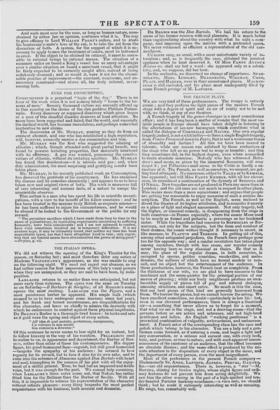THE ITALIAN OPERA.
WE did not witness the opening of the King's Theatre for the season, on Saturday last ; and must therefore defer any notice of Madame VESPERMANN'S appearance, as she was unable to sing on the following night. We need not regret our absence, as we had rather receive the first impression of this lady's vocal powers when they are unimpaired, as they are said to have been, by indis- position. LABLACHE returns to us earlier than was anticipated, but not more early than welcome. The opera was the same on Tuesday as on Saturday—BBarbiere di Seviglia; of all Rossixis comic operas the most exciting. LABLACHE was the Figaro, and a most ponderous barber he appeared. His ample bulk (which seemed to us to have undergone some increase since last year), and his frank and honest countenance, are disqualifications for this character, and leave us chiefly to admire the dexterity with which he endeavours to combat against these physical ineptitudes. DE BEGNIS'S Barber is a thorough-bred knave : he looks and acts as if gold were the spring and object of every action.
"All' idea di quel metallo, portentoso, onniposente, Un vulcano la mia mente Gia comincia a diventar."
Of this sentence he never seems to lose sight for an instant, but to follow knavery in the way of his vocation. PELLEGRINI used to realize to us, in appearance and deportment, the Barber of Ros- sun, rather than either of these his contemporaries. His dapper figure, his good-humoured face—roguish, but still good-humoured —bespoke the sympathy of his audience : he seemed to love roguery for its reward, but to love it also for its own sake, and to enter into the schemes of Almaviva against Don Bartok) with heart and soul, triumphing in the success of his plot with all the enjoy- ment of a skilful general. True, he had but an impaired and feeble voice, but it was enough for the part. We cannot help surmising, when LABLACHE'S three notes come out, that Nature has rather fitted him for the Bellman than the Barber of Seville. With all this, it is impossible to witness his representation of the character without infinite pleasure : every thing bespeaks the most perfect acquaintance with his business, both musical and dramatic. DE BEGNIS was the Don Bartolo. We hail his return to the scene of his former renown with real pleasure. It is much better than vagabondizing about the country with what he calls a com- pany, and imposing upon the natives with a pretended opera. We never witnessed so efficient a representation of the old cur- mudgeon. C URIONI sang, as usual, with a most unfortunate variety of in- tonation ; and, as is frequently the ease, obtained the greatest applause when he least deserved it. Of Miss FANNY AYTON'S Rosina we shall say but a word : she appeared only as a substi- tute, and, we suppose, did her best. In the orchestra, we discerned no change of importance. SPAG- NOLETTI, MORI, LINDLEY, DRAGONETTI, WILLMAN, CARD, PLATT, and HARPER, were in their accustomed places. MACKIN- TOSH is still excluded, and his place most inadequately filled by some French protege' of M. LAPORTE.


























 Previous page
Previous page